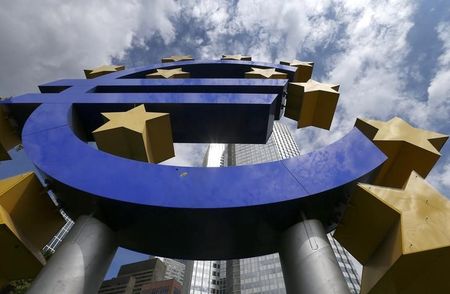By Robin Emmott
BRUSSELS (Reuters) - Deflation hit five peripheral euro zone countries in September as inflation slipped to its lowest for five years and exports faltered, data on Thursday showed, offering little hope that the bloc will avoid its third recession in six years.
While consumer inflation at 0.3 percent was unchanged from Eurostat's Sept. 30 estimate and met market expectations, Greece, Spain, Italy, Slovenia and Slovakia showed deflation in the month on persistently depressed household demand.
With such a minimal cushion against deflation, calls on the European Central Bank to consider U.S.-style bond-buying, or quantitative easing, are likely to intensify.
Deflation makes it even harder for the heavily indebted currency area to pay off borrowings that are a drag on growth.
"There's a real risk that the euro zone is entering another recession. The inflation number is dangerously close to zero," Capital Economics senior European economist, Jennifer McKeown, said.
"We think the European Central Bank will probably announce a full-blown quantitative easing programme in the months ahead," she said.
As unemployment sticks at near record levels and with business confidence weakening again, Europeans are reluctant or unable to spend to support a recovery that began in early 2013. It has failed to pick up and is looking increasingly fragile.
Thursday's data also showed the pace of price rises slowed from August's 0.4 percent reading, the EU's statistics office Eurostat said. As well as the five member states registering deflation, Portugal and Cyprus showed no inflation.
The very low inflation number, the twelfth consecutive month in the ECB's danger zone of less than 1 percent, partly reflects the fall in world oil prices. Brent crude oil prices have tumbled by more than a quarter since mid-June. Euro zone annual energy inflation was down 2.3 percent in September.
Core inflation -- closely watched by the ECB and strips out volatile energy and food prices -- was a meagre 0.8 percent, falling from 0.9 percent in August, and back at levels seen in June and July." The consensus view was that headline inflation would gradually start to pick up again from the fourth quarter," ING economist, Martin van Vliet, said.
"But now that oil prices have tanked, headline inflation may stay close to zero for longer and not reach 1 percent before the end of next year, if at all," he said.
TRADE SURPLUS MASKS FALLING EXPORTS
Exports in August meanwhile fell 3 percent on an unadjusted, annual basis and slipped 0.9 percent compared with July, adjusted for seasonal swings, Eurostat said in a separate release. Imports also fell.
Euro zone exports to the rest of the world have been one of its strong points since the 2009-2012 debt crisis damaged local demand and business confidence, but a slowing Chinese economy and the crisis with Russia over Ukraine are taking their toll.
Eurostat's data showed euro zone goods exports to Russia fell 14 percent year-on-year in the first seven months of 2014.
The August data did show a 9.2-billion-euro ($11.7-billion) trade surplus, which could help the euro zone's output in the third quarter, but slumping exports makes worrying reading.

"The bottom line is that the rising trade surplus will propel the current account surplus and be supportive for the euro on the forex markets," BNP Paribas economist, Dominique Barbet, said. "However, the decline in imports and exports are a sign of poor economic activity," she said.
(Editing by Louise Ireland)
